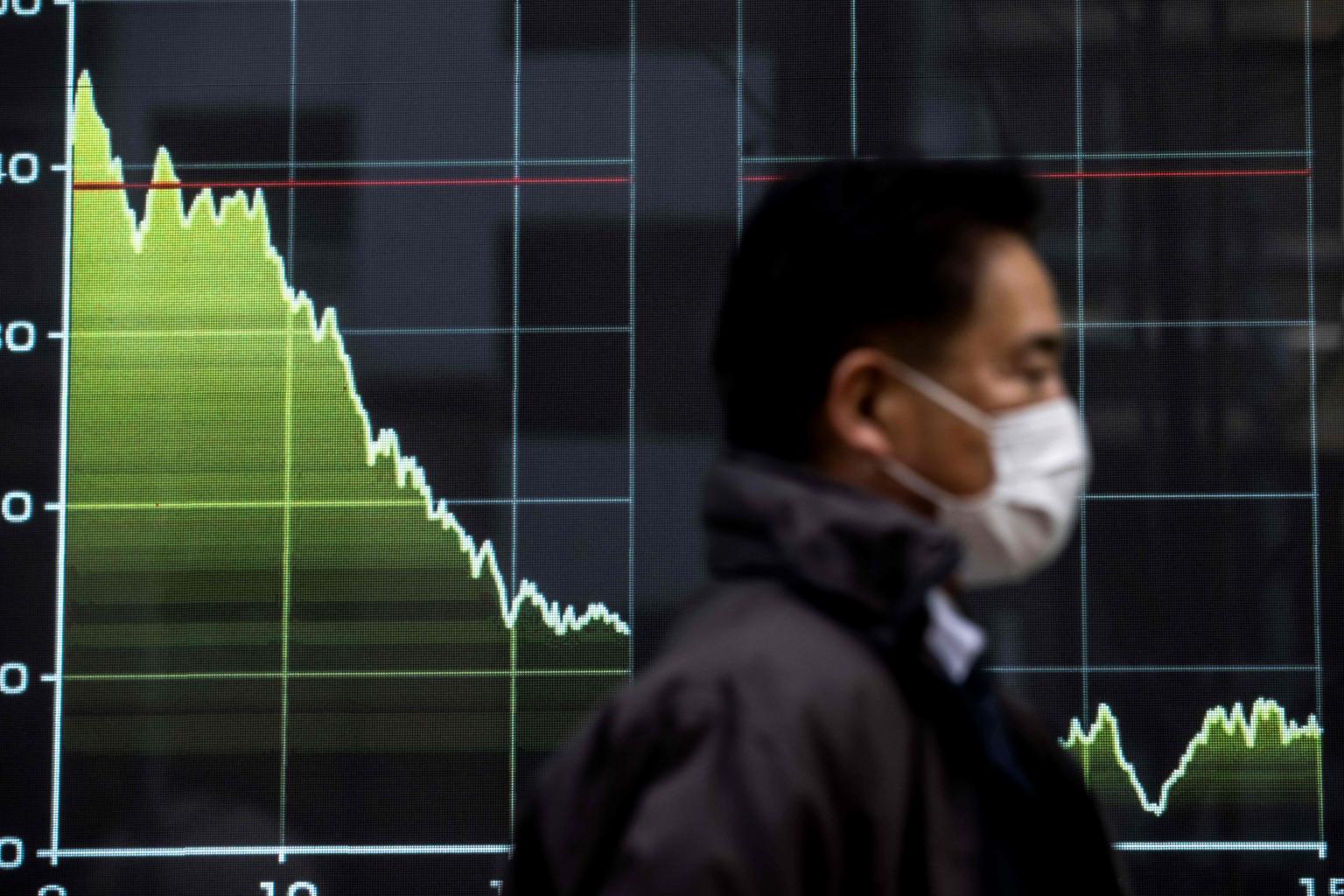Asian stock markets sink, oil hits 7-year high as Ukraine crisis escalates
Sign up now: Get ST's newsletters delivered to your inbox

Asian stock markets tumbled with Hong Kong being the biggest casualty in the region with a 2.7 per cent drop.
PHOTO: AFP
SINGAPORE - Stock markets across Asia were a sea of red, while oil prices hit seven-year highs amid the threat of a full-scale invasion of Ukraine by Russia.
The repercussions from likely sanctions from the West, even higher energy and commodity prices and more hawkish monetary policy measures could disrupt the global economic recovery from the Covid-19 pandemic.
The Straits Times Index (STI) lost 35.78 points, or 1.04 per cent, to close at 3,400.58 on Tuesday on a sell-off in US futures.
This came after Russian President Vladimir Putin recognised two breakaway regions in eastern Ukraine as independent, ordered forces into the area, and likely torpedoed a last-minute bid for a summit with US President Joe Biden.
Mr Biden was set to order retaliatory sanctions on the separatist regions of Ukraine, with the European Union vowing to take additional measures.
Mr Biden was set to order retaliatory sanctions on the separatist regions of Ukraine, with the European Union vowing to take additional measures.
Brent crude futures jumped to a high of US$97.40 a barrel - their highest since September 2014. Natural gas was up nearly 7 per cent to US$4.74 per million British thermal units.
“There’s fear in the local market but not panic selling. Even though some took profit, optimism over local banks’ earnings helped offset some of the geopolitical risk,” CIMB Private Banking economist Song Seng Wun said.
DBS Bank, OCBC Bank and UOB, which maintain a combined 45 per cent weight in the STI, have averaged 16 per cent gains so far this year, on recent expectations of five to seven interest rate hikes by the US Federal Reserve this year. This compared with the trio averaging 25 per cent total returns in 2021, according to a Singapore Exchange market update on Monday.
So far this year, Singapore stocks have drawn $1.9 billion in net institutional inflow, with DBS, OCBC and UOB accounting for a combined $1.4 billion of that amount, the update said.
Mr Song added: “While we are worried about supply disruptions because of the Ukraine crisis, oil prices haven’t breached US$100 a barrel yet because of the possibility that international talks could lead to a lifting of sanctions on Teheran, which could put more Iranian oil in the market.”
But some analysts say oil prices are likely to remain volatile in the near term because Iranian crude is unlikely to return until later this year.
Meanwhile, the worst performers yesterday included Singapore Airlines and Dairy Farm, which shed 2.4 per cent each, and Yangzijiang Shipbuilding, which lost 2.86 per cent.
“These stocks, which are a proxy for economic recovery, did poorly as the prospects of an invasion and higher energy prices can threaten the global recovery,” said Mr Colin Low, assistant manager, research and portfolio management, FSMOne.com.
Gold, on the other hand, may have “more upside potential until the political skies are clear”, said Ms Margaret Yang, IG’s DailyFX strategist.
Spot gold added 0.2 per cent to US$1,909.10, having earlier hit a new six-month high of US$1,911.56.
“Heightened geopolitical tensions also appear to outweigh worries about Fed tightening, alleviating pressure on the yellow metal,” she added.
Hong Kong was the biggest casualty in the region with a 2.7 per cent drop on fears of a new wave of regulatory scrutiny after it was reported that the Chinese authorities had told banks and state firms to report their financial exposure and links to Mr Jack Ma’s Ant Group.
Shanghai stocks were down nearly 1 per cent, while Shenzhen dropped 1.3 per cent. Japan lost 1.7 per cent, while Taiwan and South Korea each shed 1.3 per cent.
“The pull-back in Asian stocks isn’t as bad as it seems because markets aren’t pricing in a full-blown war despite the latest developments. A bigger worry is the fallout from sanctions on Russia, which supplies one-third of gas to Europe. That will have a big impact on crude oil and gas prices, which could mean higher petrol and electricity prices for us,” said KGI analyst Joel Ng.
Despite the latest development, some analysts have not ruled out some sort of a peaceful compromise.
Mr Kelvin Tay, regional chief investment officer of UBS Global Wealth Management, said: “At this point, we doubt the full scale of sanctions threatened by the West will be rolled out... (to) minimise collateral damage to the European and global economy.”
But RHB Bank Singapore’s head of equity research Shekhar Jaiswal noted: “Any disruption of food supplies out of the region could further fuel food inflation.
“Rising commodity prices could derail the global economic recovery and would further elevate US inflation. This creates a risk that the Federal Reserve could end up raising interest rates aggressively to counter the impact of higher inflation.
“For Singapore, we could see similar risks of elevated inflation amid higher food and commodity prices. Close to 95 per cent of Singapore’s electricity is generated from natural gas."
He added: “Federal Reserve governor Michelle Bowman has suggested that a half percentage-point increase in interest rates could be on the table next month if incoming readings on inflation come in too high.
“It seems markets are pricing in a higher possibility that the Fed could raise rates by 50 basis points in March.”


